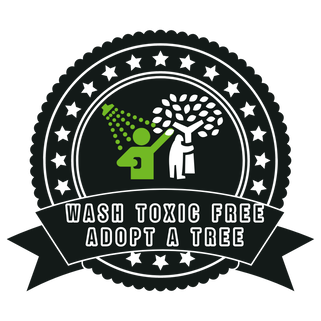FAQs
How is soap made naturally?
Saponification* is a process by which triglycerides are reacted with lye (dissolved in water) to produce "soap."
The triglycerides for ZERO soap is found in 100% virgin cold pressed organic hemp seed oil.
*The naturally derived ingredients from this process are Potassium Hempseedate and Glycerin.
There is ZERO trace of lye and OUR soap is pH neutral
The ZERO soap process is based on a traditional method & recipe for creating the most organic, synthetic free soap; utilising the natural exothermic reaction to create the simplest and most effective form of soap.
Saponification* is a process by which triglycerides are reacted with lye (dissolved in water) to produce "soap."
The triglycerides for ZERO soap is found in 100% virgin cold pressed organic hemp seed oil.
*The naturally derived ingredients from this process are Potassium Hempseedate and Glycerin.
There is ZERO trace of lye and OUR soap is pH neutral
The ZERO soap process is based on a traditional method & recipe for creating the most organic, synthetic free soap; utilising the natural exothermic reaction to create the simplest and most effective form of soap.
What are the benefits of glycerin?
Glycerin is a humectant, which draws water into the outer layer of skin. This helps the dead skin cells fall off, helps the skin keep in more water, and leaves the skin feeling smoother and softer. Oily skin that is prone to acne and inflammation will benefit from the skin-soothing properties of glycerin. Glycerin is naturally anti-inflammatory.
During the saponification process (making seed oil into soap) the end result is a naturally derived ingredient and is not a synthetic ingredient.
Glycerin is a humectant, which draws water into the outer layer of skin. This helps the dead skin cells fall off, helps the skin keep in more water, and leaves the skin feeling smoother and softer. Oily skin that is prone to acne and inflammation will benefit from the skin-soothing properties of glycerin. Glycerin is naturally anti-inflammatory.
During the saponification process (making seed oil into soap) the end result is a naturally derived ingredient and is not a synthetic ingredient.
What are the benefits of soft water?
De-ionised water wants to absorb ions* because it has been stripped of its own (*electrically charged atoms and molecules removed through a filtration or de-ionisation process)
These ions can include the minerals and contaminants found in dirt, which makes it an effective cleaning agent. It is especially effective as it leaves no residue (ask a window cleaner!).
Due to its high purity, using within cosmetic products extends shelf life being almost pure H20 containing no IONS and no charge.
Rainwater is naturally de-ionised!
De-ionised water wants to absorb ions* because it has been stripped of its own (*electrically charged atoms and molecules removed through a filtration or de-ionisation process)
These ions can include the minerals and contaminants found in dirt, which makes it an effective cleaning agent. It is especially effective as it leaves no residue (ask a window cleaner!).
Due to its high purity, using within cosmetic products extends shelf life being almost pure H20 containing no IONS and no charge.
Rainwater is naturally de-ionised!
Can I use tap or bottled water?
Using tap water* (unless in a soft water area or home supply is treated) will be least effective, but *WARM water will always work, so use only a little soap paste and less water at a time.
For optimal results always use SOFT WATER which will be De-Ionised, Aqua, Distilled, Reverse Osmosis or Rainwater (which is free, local and naturally SOFT!) Tap water normally contains ions which have come from the soil, e.g. sodium and calcium; also ions from water pipes, e.g. iron and copper.
To test your water, simply add a small amount of ZERO Soap Paste to water. If the water remains clear and not cloudy, your water is SOFT. Yay!
Using tap water* (unless in a soft water area or home supply is treated) will be least effective, but *WARM water will always work, so use only a little soap paste and less water at a time.
For optimal results always use SOFT WATER which will be De-Ionised, Aqua, Distilled, Reverse Osmosis or Rainwater (which is free, local and naturally SOFT!) Tap water normally contains ions which have come from the soil, e.g. sodium and calcium; also ions from water pipes, e.g. iron and copper.
To test your water, simply add a small amount of ZERO Soap Paste to water. If the water remains clear and not cloudy, your water is SOFT. Yay!
What are the benefits of activated charcoal?
ZERO products contain food/cosmetic grade activated charcoal from Soil Association accredited sources in the UK when we are unable to manufacture our own. The unique nature of ZERO and our traditional natural farming methods enable us to utilise the "waste" from the growing of hemp to make activated hemp charcoal utilising the hemp stalk/shiv (ain't no coconuts grown in Devon!)
Charcoal is "activated" by steam from boiling water (we have a unique ZERO WASTE ACTIVATION method which ensures this process is emission free).
Activated Charcoal (carbon) is used in many health and beauty products for it's ability to absorb toxins and impurities. The structure of microscopic small pores allows it to absorb chemical substances such as impurities and oil on the skin and hair. It is an inert element and is often consumed for gut health.
ZERO products contain food/cosmetic grade activated charcoal from Soil Association accredited sources in the UK when we are unable to manufacture our own. The unique nature of ZERO and our traditional natural farming methods enable us to utilise the "waste" from the growing of hemp to make activated hemp charcoal utilising the hemp stalk/shiv (ain't no coconuts grown in Devon!)
Charcoal is "activated" by steam from boiling water (we have a unique ZERO WASTE ACTIVATION method which ensures this process is emission free).
Activated Charcoal (carbon) is used in many health and beauty products for it's ability to absorb toxins and impurities. The structure of microscopic small pores allows it to absorb chemical substances such as impurities and oil on the skin and hair. It is an inert element and is often consumed for gut health.
How do I make foaming soap?
1. Add a pea-sized amount of paste (no more than 1g of paste is needed for each 60ml).
2. When water is warm the paste will dissolve quicker.
3. Add your own choice of scent or treatment (i.e. any essential oil can be added according to your requirements).
TO MAKE 2.5 litres+ FOAMING SOAP
(TOP TIP: if making soap to be stored, use deionised or rainwater - unless your tap water is naturally/treated soft)
1. Add 50ml of soap paste to 2.5 litres of deionised water (it's possible to add up to 3 litres)
2. When water is warm the paste will dissolve quicker.
3. Add your own choice of scent or treatment (i.e. any essential oil can be added according to your requirements).
1. Add a pea-sized amount of paste (no more than 1g of paste is needed for each 60ml).
2. When water is warm the paste will dissolve quicker.
3. Add your own choice of scent or treatment (i.e. any essential oil can be added according to your requirements).
TO MAKE 2.5 litres+ FOAMING SOAP
(TOP TIP: if making soap to be stored, use deionised or rainwater - unless your tap water is naturally/treated soft)
1. Add 50ml of soap paste to 2.5 litres of deionised water (it's possible to add up to 3 litres)
2. When water is warm the paste will dissolve quicker.
3. Add your own choice of scent or treatment (i.e. any essential oil can be added according to your requirements).

